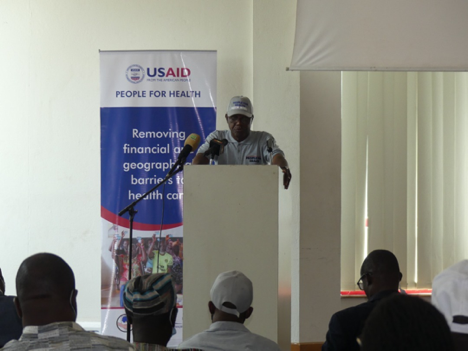Government has been urged to increase the budgetary allocation for the health sector to help address and manage the numerous challenges it is battling with.
Siapha Kamara, Chief Executive Officer of SEND Ghana – a civil society organisation, who made the call noted that the health centres in the district assemblies serve mostly the poor and vulnerable people in the country, yet face a lot of challenges due to unavailable funds that should be used for basic provisions.
“Increase the health budget and make sure that the district assemblies have enough resources, and make sure that money goes down to the community and management committees. That is where most of the poor people in Ghana get health services, but they lack very basic resources,” he said at a ‘People for Health’ closeout event held in Accra.
Stressing some barriers identified by SEND Ghana during the ‘People for Health’ sensitisation programme, he said most health facilities lack some basic equipment that helps in delivering health care to community members.
He indicated that the human resources are available and ever ready to work, but inadequate infrastructure remains a great challenge to them – attributing the situation to low budget allocation as well as misappropriation of the little that is given.
“The human resources are there, but not the budget for them to work with. If you go to the Community Health Planning and Services (CHPS), basic things used to serve patients are not there; some do not even have a thermometer or stethoscope; they cannot afford it,” he said.
The ‘People for Health’ project was implemented between 2016 and 2021 in 100 underserved communities of the Greater Accra, Eastern, Northern, North East, Savannah, Volta and Oti Regions. The implementation of ‘People for Health’ was led by a consortium comprising SEND Ghana, Penplusbytes and the Ghana News Agency – funded by the United States Agency for International Development (USAID).
Highlighting some impacts from the programme, Mr. Kamara indicated that some communities, after sensitization, began providing support toward renovating some health structures and other important areas.
“It was the people who raised resources to build facilities for nurses to have accommodation. It was a community that raised resources to construct a water facility. In fact, in one community the structure was totally burned down – but through the ‘People for Health’ methodology, the community mobilised their own resources to put it back up,” he noted.
Speaking on the programme’s theme, ‘Showcasing and Strengthening Volunteerism for Equitable Health Service Delivery’, he said it is necessary to celebrate volunteers – especially when their efforts are covering government inefficiencies.
Some partners that contributed immensely to the project were honoured with certificates and citations, and were urged to continue supporting SEND Ghana in their quest to make access to health successful in the country.










